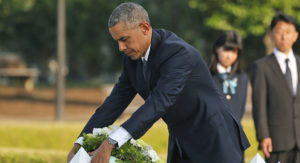I am drawn by a particular passage from remarks President Obama made while visiting Hiroshima.
“We’re not bound by genetic codes to repeat the mistakes of the past. We can learn. We can choose. We can tell our children a different story,” Obama said in remarks at the memorial that commemorates the dropping of the atomic bomb on the Japanese city on Aug. 6, 1945.
To be sure, the president did not deliver an apology for the decision one of his predecessors, Harry Truman, made in seeking an end to the bloodiest war in human history.
Nor should he.
But the statement seems to imply that the decision was a “mistake.”
I beg to differ, Mr. President. I think many of your fellow Americans beg to differ as well, particularly those of us who are descended from those who were participating in that theater of operations at the end of the war.
The president’s speech was far-reaching and it spoke to a “moral awakening” that the event brought to the world. Indeed, it did, and for that awakening we should be grateful. The world saw first hand in 1945 just destructive these weapons can be.
http://www.politico.com/story/2016/05/obama-hiroshima-visit-223645
President Truman, who took office upon the death of Franklin D. Roosevelt, felt at that moment he had to make a decision that would (a) end the war quickly and (b) change the world forever.
It did both. President Truman said late in his life that he never regretted the decision to drop the bomb on Hiroshima and, three days later, on Nagasaki.
For me personally, he might have saved my own father’s life. Dad was in the Philippines serving in the Navy and well could have taken part in the campaign against the Japanese homeland. The bombs prevented that campaign from occurring.
Those of us who have this connection with what happened that at the end of World War II perhaps see the event with a different form of clarity than others.
I’m glad President Obama has spoken out about the need to remain alert to the tragedy of these terrible weapons.
Was its use in Japan a “mistake”?
No. It was not.

He is incredibly naive to even hope for a world without nuclear weapons. It’s no small coincidence there has not been another world war since August 1945.
Not only did the bombings of Hiroshima and Nagasaki save from 100 to 500 thousand American lives but probably upwards of 1 million Japanese who would have been killed in a futile effort to stop the American advance. And that’s just the immediate and foreseeable result.
A third world war between NATO powers and the countries of the Iron Curtain was nearly inevitable until the world got a glimpse of the destruction that could be wrought in the blink of an eye. How many were saved in the world war that never was because of these bombs.
The cold calculus that faced Truman in the summer of ’45 is as true today as it was back then – kill tens of thousands in order to save millions. The atomic bombings of Hiroshima and Nagasaki were terrible acts and I hope they are never repeated. But Truman chose the better of two terrible paths and saved untold lives in the process. I hope any future president has that option available to him in order that Never has to exercise it.
Yes to all of the above.